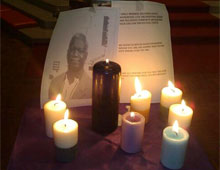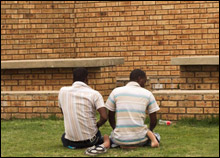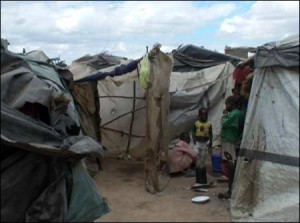
In Hopley Farm, Harare, 8,500 adults live in makeshift housing: out of 2,000 school age children, 75% are out of formal school. (July 2010)
By Busani Mpofu
The World Bank estimated urban poverty in Zimbabwe in 1990/91 to be 12 percent while the 1995 Poverty Assessment Study found urban poverty to be 39 percent. In January 2009, Save the Children estimated that 10 out of 13 million Zimbabweans, over 75 percent of the population, were living in ‘desperate poverty.’ In April 2010, UNICEF noted that 78 percent of Zimbabweans were “absolutely poor” and 55 percent of the population, (about 6.6 million) lived under the food poverty line while New Zimbabwe estimated that more than 65 percent of Zimbabweans lived below the poverty datum line in December 2009. Recently, commentators have argued that it is very clear that poverty is increasing in the country. The sense we get from the above statistics is that some agencies have defined certain percentages of Zimbabweans as poor, below some abstractly conceived poverty lines. The statistics, however, do not tell us how long those poor people have existed in poverty conditions or the historical and social dimensions of people’s understandings of poverty-what it is to ‘be poor.’
(Read more…)
Fri, September 16 2011 » Essays, Zimbabwe Review » Leave a comment
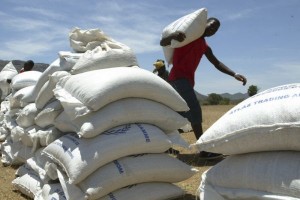
Food aid being distributed in Zimbabwe
By Norma Kriger
Western donors understandably tread warily in Zimbabwe where ZANU PF remains the overwhelmingly dominant governing party in a formal coalition government. The “Inclusive Government” (IG) was formed in February 2009, following the signing of the Global Political Agreement (GPA) in September 2008 by ZANU PF, Tsvangirai’s MDC (MDC-T) and a smaller MDC formation. Western governments, initially opposed to the formation of a coalition government, continue to enforce travel bans and asset freezes against ZANU PF individuals and ZANU PF-affiliated entities. ZANU PF has persisted with its strident animosity to Western governments and donors, and has made these sanctions policies a major reason for stalling on the implementation of the GPA. While ZANU PF blames the sanctions for retarding economic recovery, Western bilateral donors rightly point to their substantial humanitarian aid – nearly US$651 million or 15-20% of GDP in 2009. This aid also happens to boost the image of the MDC parties, which were allocated Ministerial control of services, including health and education, while ZANU PF ensured it retained the security and foreign affairs Ministries, among others. (Read more…)
Fri, August 12 2011 » Zimbabwe Review » Leave a comment
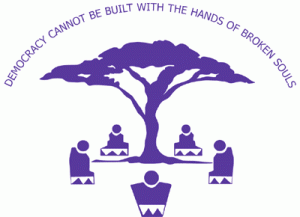 Statement by Owen Sheers
Statement by Owen Sheers
In 2004 I published The Dust Diaries, an account of my journey tracing the life and legacy of my great, great uncle, the maverick missionary and activist for African rights Arthur Shearly Cripps. My journey in Cripps’ footsteps finished at his graveside in the knave of a ruined church deep in the Zimbabwean veldt. The church was built by Cripps in the style of Great Zimbabwe. It was midnight and hundreds of people were packed between its walls, dancing and singing around my uncle’s grave. Fires picked out the shape of the kopje that rose above us, testament to the 700 Zimbabweans who had, despite fuel shortages and other difficulties, made the journey to this isolated place to celebrate Arthur’s life and remember his fifty years living and working with the Shona people around Chivhu. The celebrations lasted for three days. Remarkably ecumenical in nature, both Anglican service and traditional Shona pungwe, they constituted the annual ‘Shearly Cripps Festival’, an event attended by Zimbabwean Anglicans for over fifty years. (Read more…)
Thu, August 4 2011 » Press Releases » 1 Comment
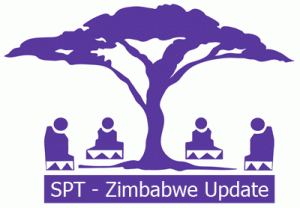 The excitement over the resolutions of the SADC Troika meeting in Livingstone, Zambia, at the end of March 2011, was largely focused on the stronger stance taken by the organ over the abuses of the Mugabe regime, and more particularly the continued obstacles placed by the latter over the implementation of the GPA. In effect however, the Livingstone resolutions brought into effect the major strength of the SADC mediation, which has been to lock the Mugabe regime into structures of accountability. Whatever the weaknesses of the GPA, and there are many, it has forced Zanu PF into closer accountability for its behavior at different levels including cabinet, parliament, JOMIC, the constitutional reform process, SADC, the AU and its relations with the West.
The excitement over the resolutions of the SADC Troika meeting in Livingstone, Zambia, at the end of March 2011, was largely focused on the stronger stance taken by the organ over the abuses of the Mugabe regime, and more particularly the continued obstacles placed by the latter over the implementation of the GPA. In effect however, the Livingstone resolutions brought into effect the major strength of the SADC mediation, which has been to lock the Mugabe regime into structures of accountability. Whatever the weaknesses of the GPA, and there are many, it has forced Zanu PF into closer accountability for its behavior at different levels including cabinet, parliament, JOMIC, the constitutional reform process, SADC, the AU and its relations with the West.
For authoritarian parties like Zanu PF, all these forms of having to answer to various fora are anathema, as they provide varying means of eroding the monopoly of power that the regime has become completely accustomed to. The accumulation of small reforms and the slow dispersal of power provide a major challenge for such structures of authoritarian power, as they provide the possibility of a cumulative momentum of dissent that can be very difficult to control. When combined to the major challenge of the succession problem in Zanu PF, now an very urgent issue in the light of Mugabe’s waning health, these factors have pushed Zanu PF into emergency election mode. (Read more…)
Fri, June 24 2011 » Global Political Agreement, Zimbabwe Update » 1 Comment
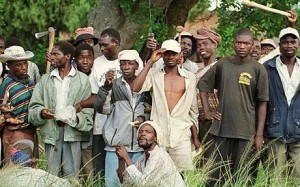
Violent land seizures began in Zimbabwe in 2000 carried out by "war veterans"
Paper presented by Wilfred Mhanda to the SAPES Trust Policy Dialogue Forum in Harare on 7 April 2011. Wilfred Mhanda, aka Dzinashe Machinugura, was a commander of the Zimbabwe People’s Army (Zipa), and in the leadership of the alternative Zimbabwe Liberators Platform.
Zimbabwe’s former liberation fighters have become a household name for all the wrong reasons. This paper will seek to trace the development of the role of war veterans in Zimbabwe’s political and economic processes particularly from 1997 onwards to date and provide a contextual background for their perceived role and put the public perception of the former fighters in perspective.
The war veterans came into being with the demobilisation of those former ZIPRA and ZANLA fighters who were not attested into the Zimbabwe National Army, ZNA in 1980. The advent of Zimbabwe’s independence on 18 April 1980 and the subsequent formation of the Zimbabwe National Army made the former liberation armies both superfluous and redundant as their mission of liberating Zimbabwe had been accomplished. ZIPRA and ZANLA no longer had any role to play in an independent Zimbabwe. From then onwards, we could only refer to former ZANLA and former ZIPRA fighters. It is these fighters who then became referred to as veterans of the national liberation war. Maintaining the ZIPRA/ZANLA labels and their links to the liberation parties would have only served to undermine the unity and cohesion of the new army as evidenced by the counter-productive ZANLA/ZIPRA clashes in places like Entumbane in 1980/81. (Read more…)
Fri, May 13 2011 » History, Zimbabwe Review » 1 Comment





